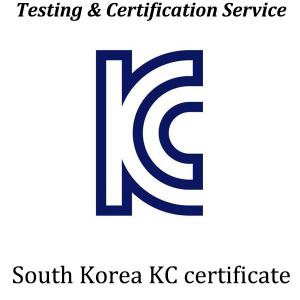

Add to Cart
South Korea KC Testing & Certification,What is South Korea KC Testing & Certification?
Korea KC certification introduction
The Ministry of Knowledge Economy (MKE) announced on August 25,
2008 that the Korean National Standards Commission will implement a
new national unified logo, the "KC" logo, from July 2009 to
December 2010. The "KC" logo means "Korea Certification". KC
certification is a Korean electrical and electronic products safety
certification system. It is based on the Korea Electronics
Standards Institute (KATS) in accordance with the "Electric
Appliance Safety Management Act" The mandatory safety certification
system that was implemented on January 1, 2009.
In order to avoid duplicate certification, from July 1, 2012, EMC and Safety are managed separately. For electronic and electrical products that apply for Korean certification, KC certificates and KCC must be obtained for safety and electromagnetic compatibility (EMC) requirements. Certificate (new MSIP). There are two KC-certified certification organizations: KTC, Korea Testing Certification, and KTL, Korea Electrical Testing Institute. These two are not only KC certification agencies, but also qualification testing laboratories.
In terms of safety standards, all products entering the Korean
market need to comply with the Korean safety standard K standard
(similar to the IEC standard). When using the IEC standard, it must
meet South Korean requirements. National differences can be found
in the announcement of the IECB's CB system. In terms of EMC, the
Korean EMI standard is similar to the CISPR standard, and the EMS
standard is similar to the EN standard.
Certification classification
Korean KC certification is divided into "KC Safety" and "KC EMC and
RF"
(I) KC Safety
The latest "Electrical Appliance Safety Management Law" requires
that KC Safety certification be divided into three categories based
on the different levels of product hazards:
· Safety Certification
Self-regulatory Safety Confirmation
· Supplier Self-Confirmation (SDoC)
Certificate validity period
1. Compulsory safety certification --- None, the annual audit
maintains effectiveness (the following template)
2. Self-disciplined safety confirmation-5 years
3. Supplier self-confirmation ----- no certificate, the
confirmation is permanently valid
Factory inspection requirements: mandatory safety certification
requires first factory inspection and annual audit
Certificate holder requirements: The mandatory safety certification
must be a factory certificate, and the other two types of
certification can be held by the factory / manufacturer / importer.
(B) KC EMC and RF
KC EMC and KC RF certifications include electromagnetic
compatibility testing, radio frequency and telecommunications
testing. According to the latest "Radio Wave Law" requirements, the
certification system is divided into three categories according to
the level of product's hazardous radio environment:
· Certification of Conformity
Registration of Compatibility
· Interim of Conformity
Application process
1. The client prepares samples and materials to submit to the
testing agency
2.The testing organization submits samples and data to KTL / KTC
for testing
3. KTL / KTC conducts safety test and issues KC test report after
the test is completed
4. (if any) For safety certification, KTL / KTC needs to arrange a
factory inspection, and then conduct an annual factory audit every
year.
5. KTL / KTC audit report and other application documents, issue KC
certificate after no problem
Application materials
1. Relevant application form
Product label
3. Product manual (Korean version)
4. Parts list
5.List of derived models
6.Circuit diagram and layout
7, parts certificate
8. Specifications for transformers and inductors
9.CB certificate and report
